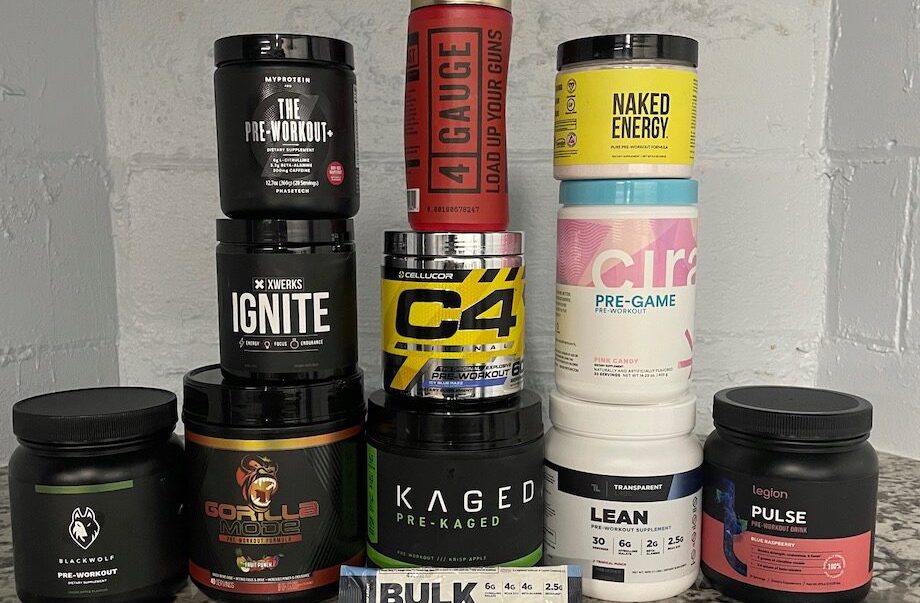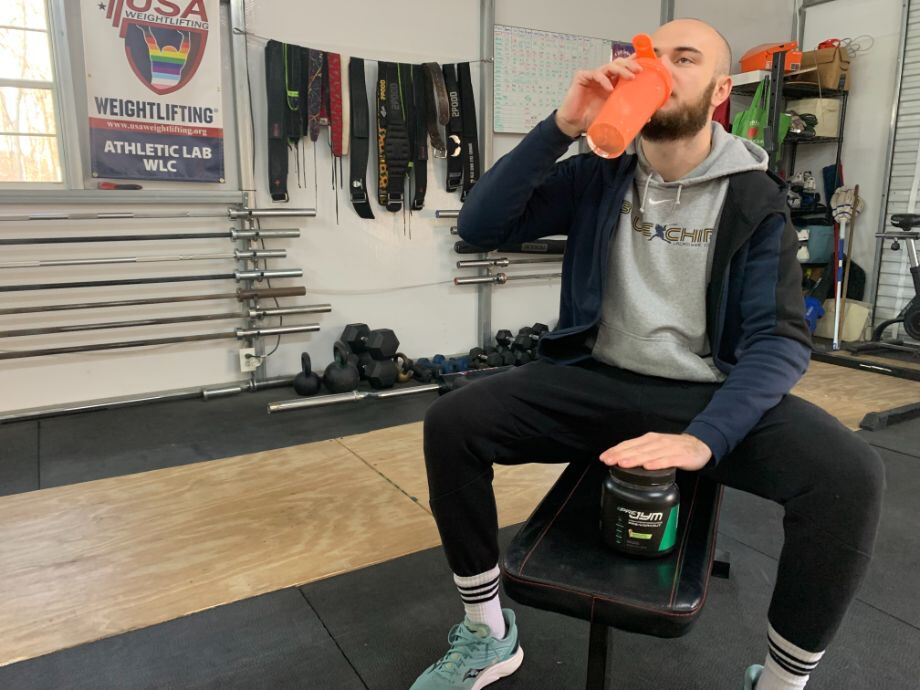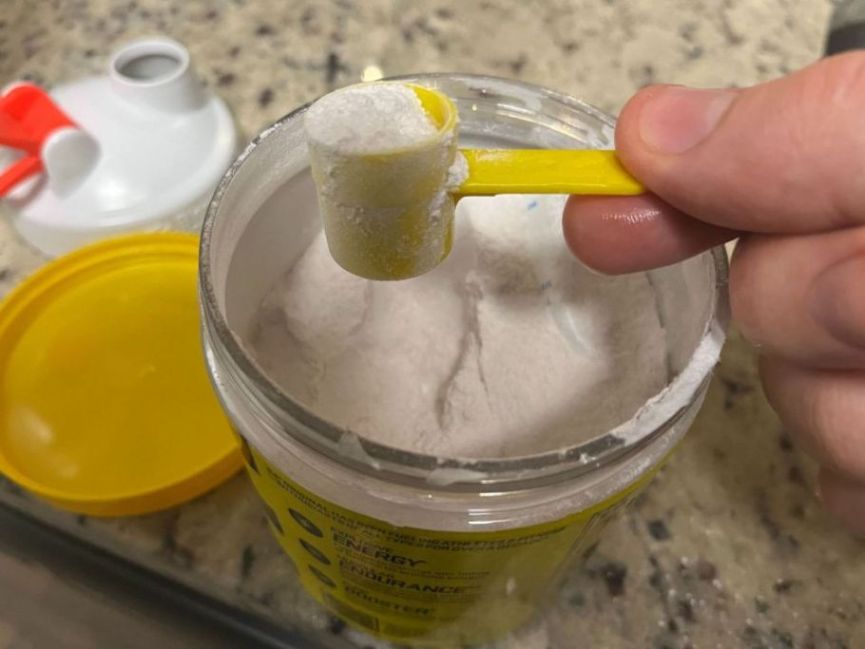We test and review fitness products based on an independent, multi-point methodology. If you use our links to purchase something, we may earn a commission. Read our disclosures.
Dry scooping is one of the latest TikTok trends gripping the fitness sector of social media and it involves scooping pre-workout powder “dry” straight from the jar into your mouth. Pre-workout powder is typically supposed to be mixed with at least 8 ounces of water and then consumed like a beverage. However, bodybuilders and other fitness influencers seem to insist that dry scooping pre-workout instead of diluting it makes it more effective. Aside from the fact that this claim has no scientific basis, the risks associated with the practice probably do not outweigh the purported benefits.
Medical disclaimer: This article is intended for educational and informational purposes only. It is not intended as a substitute for medical advice. For health advice, contact a licensed healthcare provider.
What Is Pre-Workout Powder?
Pre-workout powder is one of many dietary supplements used by bodybuilders and casual weightlifters alike. It typically contains a blend of stimulants and amino acids and comes in fun, fruity flavors. When taken before exercise, the best pre-workout ingredients can help boost energy, enhance focus, and even help with muscle growth. Here are some common ingredients:

Pre-Workout Ingredients
- Caffeine: We all know the effects of caffeine as an awakening stimulant. However, a study conducted in 20121 also found that trained adult males who consumed caffeine an hour before exercising were more motivated, and had increased resistance training performance to failure.
- Beta-alanine: When you engage in exercise, especially the type that requires explosive power, beta-alanine may help you lift more weight2 and accomplish more reps, which can have a beneficial effect on muscle gain.
- Taurine: A common ingredient in energy drinks like Bang and Red Bull, taurine also makes frequent appearances in pre-workout supplements due to studies suggesting it can lower the amount of lactate in the muscle3 which, in turn, can reduce muscle soreness and keep your muscles from fatiguing as quickly during workouts.
- Creatine: The most researched4 and proven compound of all sports-related dietary supplements, the best creatine has been shown to cause strength and muscle gains in people who regularly lift weights.
- Nitric oxide boosters: Nitric oxide and its boosters like L-arginine or L-citrulline are a darling to endurance athletes, even the pros, due to its ability to lower blood pressure and enhance blood flow. Better blood flow means oxygen is carried to your body’s tissues more quickly and efficiently which can help you go for longer before you start feeling fatigued.
- Amino Acids: Lastly, pre-workout powder may contain amino acids, especially BCAAs. While RDNs (registered dietitian nutritionists) are mixed about how solid their efficacy is, some studies have suggested they can play a role in promoting muscle protein synthesis5 and lowering serotonin6, which is responsible for early fatigue.
RELATED: Best BCAAs
How to Take a Pre-Workout
The fact of the matter is, pre-workout supplements are loaded with so many different, albeit potentially beneficial, compounds. Amino acids, creatine, sweeteners, colors, flavors, stimulants—it just makes sense to dilute them in order to safely consume them.
Furthermore, the FDA recommends7 Americans limit their caffeine intake to 400 milligrams a day and many pre-workout powders contain more than this amount. The danger is even greater when a high amount of caffeine is combined with other stimulants like beta-alanine, taurine, citrulline, and whatever other unique “proprietary blend” of energy boosting compounds.

RELATED: Best Stim-Free Pre-Workout
The best thing you can do is make sure you mix your pre-workout with water. I cannot overstate how at the top of the list that is when it comes to consuming pre-workout safely. However, you may also want to carefully track how much caffeine you are getting from your pre-workout and other beverages you may consume in addition to that throughout the day from things like cups of coffee and energy drinks.
It’s also a good idea from a safety standpoint to choose a pre-workout that has been third-party tested from bodies like NSF for Sport and Informed Choice. That doesn’t mean that it’s OK to dry scoop third-party tested pre-workouts either, but it does mean you know that the powder actually contains the amount of caffeine that it is labeled to contain.
Finally, it’s never a bad idea to consult with your healthcare provider before taking any sort of dietary supplement and ensure you’re not exposing yourself to any health risks either intentionally or unintentionally.
Why Are People Dry Scooping?
TikTok has introduced the world to so many cool things: creative dances, mind-blowing life hacks, and incredible recipes. However, there’s another side of TikTok that introduces people to head scratching things that are just an objectively bad idea. Like the cinnamon challenge (remember that?), the practice of dry scooping is the latest social media bad idea. Yet how are they justifying the practice’s glorification?
Some influencers believe if you take pre-workout without any liquid and let it absorb into the mucus membranes of your mouth directly, without diluting it, this will result in faster delivery to your bloodstream. Then, somehow, this “faster hit to the bloodstream” is conflated with better exercise performance in the gym.
Another reason TikTok users are dry scooping is even less scientific—to get more likes and followers. Much like the aforementioned cinnamon challenge, the videos of people dry scooping have received a lot of engagement and attention. So, some people are simply dry scooping to record TikTok videos of them doing it in the hopes of garnering a bigger audience on the platform.
Regardless of the reason, it is concerning to see so many adolescents being influenced to participate in such a potentially dangerous practice, especially on social media, without realizing the risks of dry scooping.
A Canadian study8 published just this year found that 17% of adolescents they surveyed reported dry scooping their pre-workout, with the prevalence being highest in those who engaged in weight training and spent more time on social media.
Dry Scooping Risks
Due to the sheer number of ingredients in pre-workout, including stimulants that can affect heart rate and amino acids that ask the liver to do a lot of work to metabolize, there is a large window of opportunity to be exposed to side effects if pre-workout is not taken as intended. So, before you coat your mouth with that raw powder, let’s talk about the potential health risks:
Caffeine Overdose
People in the fitness world tend to crave instant gratification, so it makes sense that the idea of having your caffeine hit instantly seems appealing. However, the sheer amount of caffeine included in many pre-workout supplements can turn toxic if not diluted. This becomes even more dangerous when you consider the results of a 2019 study showing that some pre-workout supplements even have a much higher caffeine content9 than the label discloses.
That said, studies have shown that ingesting 10 grams of caffeine in a day can be lethal10 with the results being irreversible kidney or liver damage. Now, it could take quite a lot of pre-workout to ingest 10 grams of caffeine. For perspective, most energy drinks and a cup of coffee contain around 300 milligrams, which is about 3% of the lethal dose.
However, the combination of dry scooping, taking a pre-workout whose caffeine content is understated on the label and ingesting caffeine from other sources throughout the day can put you unintentionally, but dangerously close to a caffeine overdose.
Accidental Inhalation
This danger has less science behind the explanation and is more of a point of common sense. To put it plainly, it’s super difficult to swallow a dry powder without water, people! Not only is it unpleasant, but it can lead to choking and trouble breathing if you inhale it while trying to get it down. As you can imagine, having a fruity powder full of chemicals inhaled into your lungs isn’t good for you and can lead to pneumonia and even lung damage.
Heart Problems
Make no mistake, this isn’t a scare tactic. A quick Google search will show you several stories of people who have developed heart palpitations and even had a heart attack after dry scooping because they saw bodybuilders doing it in TikTok videos.
These side effects can be caused by a caffeine overdose or just too much of the stimulants included in pre-workouts being introduced to the system too rapidly. This can cause a quickly rising blood pressure and a spiking heart rate which can be dangerous, especially if you have a pre-existing heart condition that you may not know about.
Digestive Issues
Ingesting a huge amount of substances without diluting them, no matter how effective they may be at boosting your workout potential, can be harmful to your digestive health, as well. That’s because the powder is meant to be diluted with water and your gut knows it.
In their raw, powdered state, all of these substances will make your gut try to dilute them on its own. It does this by pulling water from your body quickly and suddenly into your gut to restore equilibrium and make the powder easier to digest and absorb.
Unfortunately, this sudden fluid shift can cause severe stomach cramps, nausea, diarrhea, and vomiting11. Not exactly the effects you’re looking for right before a workout. The good news is, this can be avoided by just, you know, being kind to your intestines by mixing your pre-workout with some water first.
Dry Scooping Pre-Workout: Final Thoughts
It is a constant uphill battle for me as a nutritionist to debunk all of the crazy claims and practices on social media regarding diet and fitness. Most of them are dumb, but harmless. However, the dry scooping trend is downright dangerous.
As supplements are not regulated by the Food And Drug Administration, it is so important that we use them properly and in accordance with the directions in order to avoid health risks caused by their improper use. Given all of the compounds contained in pre-workout supplements that have pronounced and sometimes dramatic effects on our bodies, it’s important to listen to the manufacturer, not social media influencers, to keep yourself safe.
So, you heard it here first. The next time you think about dry scooping pre-workout powder, just don’t. Your heart, lungs, and tummy will thank you for it.
Dry Scooping Pre-Workout: FAQs
Can I dry scoop pre-workout then drink water?
The safest way to consume pre-workout is the way that is instructed on the supplement’s label. Typically, this is by diluting a scoop of pre-workout in water first and then drinking it. Dry scooping can be unsafe and come with adverse side effects.
Is it OK to dry scoop protein powder?
Dry scooping your protein powder is not recommended as there is no added benefit to exercise performance compared to taking your protein as instructed on the label and there are potentially dangerous side effects.
Is it OK to dry scoop creatine?
There is no evidence that there is an added benefit to dry scooping creatine and it may be unsafe. Furthermore, studies that have shown the benefits of creatine to exercise performance and hypertrophy suggest that creatine works best when mixed with water.
Can I take 2 dry scoops of pre-workout?
If you take large amounts of pre-workout supplements without first diluting them with water, you are putting yourself at risk by introducing a large amount of stimulants and other compounds to your system, which you really should not do.
Can you take pre-workout as a shot?
This is another case of “it depends on how you do it.” As we’ve established, a dry “shot” of pre-workout isn’t going to do you much good and can have negative side effects. If you stick with the correct dosage diluted in liquid, you may be able to take it as a shot if you so desire. For example, you could create a “jello shot” by mixing your (accurately dosed) pre-workout with a packet of your preferred gelatin flavor and freezing it.
References
- Duncan MJ, Smith M, Cook K, James RS. The acute effect of a caffeine-containing energy drink on mood state, readiness to invest effort, and resistance exercise to failure. J Strength Cond Res. 2012;26(10):2858-2865. doi:10.1519/JSC.0b013e318241e124
- Hoffman J, Ratamess NA, Ross R, et al. Beta-alanine and the hormonal response to exercise. Int J Sports Med. 2008;29(12):952-958. doi:10.1055/s-2008-1038678
- Kurtz JA, VanDusseldorp TA, Doyle JA, Otis JS. Taurine in sports and exercise. J Int Soc Sports Nutr. 2021;18(1):39. Published 2021 May 26. doi:10.1186/s12970-021-00438-0
- Wu SH, Chen KL, Hsu C, et al. Creatine Supplementation for Muscle Growth: A Scoping Review of Randomized Clinical Trials from 2012 to 2021. Nutrients. 2022;14(6):1255. Published 2022 Mar 16. doi:10.3390/nu14061255
- Kiani AK, Bonetti G, Medori MC, et al. Dietary supplements for improving nitric-oxide synthesis. J Prev Med Hyg. 2022;63(2 Suppl 3):E239-E245. Published 2022 Oct 17. doi:10.15167/2421-4248/jpmh2022.63.2S3.2766
- Fujita S, Dreyer HC, Drummond MJ, et al. Nutrient signalling in the regulation of human muscle protein synthesis. J Physiol. 2007;582(Pt 2):813-823. doi:10.1113/jphysiol.2007.134593
- FDA. Spilling the Beans: How Much Caffeine is Too Much? U.S. Food and Drug Administration. Published December 12, 2018.
- Ganson KT, Hallward L, Testa A, Jackson DB, Nagata JM. Prevalence and correlates of dry scooping: Results from the Canadian Study of Adolescent Health Behaviors. Eat Behav. 2023;48:101705. doi:10.1016/j.eatbeh.2023.101705
- Kim DH, Kim SH, Jeong WS, Lee HY. Effect of BCAA intake during endurance exercises on fatigue substances, muscle damage substances, and energy metabolism substances. J Exerc Nutrition Biochem. 2013;17(4):169-180. doi:10.5717/jenb.2013.17.4.169
- Desbrow B, Hall S, O’Connor H, Slater G, Barnes K, Grant G. Caffeine content of pre-workout supplements commonly used by Australian consumers. Drug Test Anal. 2019;11(3):523-529. doi:10.1002/dta.2501
- Murray A, Traylor J. Caffeine Toxicity. In: StatPearls. Treasure Island (FL): StatPearls Publishing; August 14, 2022.
- Zhang X, O’Kennedy N, Morton JP. Extreme Variation of Nutritional Composition and Osmolality of Commercially Available Carbohydrate Energy Gels. Int J Sport Nutr Exerc Metab. 2015;25(5):504-509. doi:10.1123/ijsnem.2014-0215
Further reading

Building a home gym can be both a daunting and expensive task. I've had one now for nearly a decade and have taken pretty much all of my best advice and compiled it in this ultimate home gym guide. Read more

Learn how to keep your machine in superior shape: how to lubricate a treadmill Read more

The climbing pegboard has become popular ever since introduced by Dave Castro at the CrossFit Games. Although they aren't too expensive to buy, they're even cheaper to make. Here's how to make your own DIY Climbing Pegboard. Read more

A certified nutrition coach shares her experience with OWYN’s plant-based protein shakes in this OWYN protein powder review. Read more

